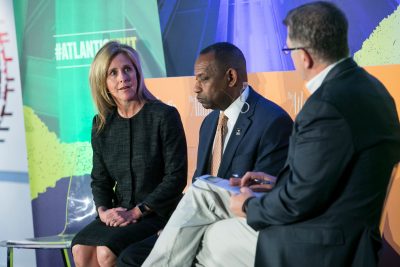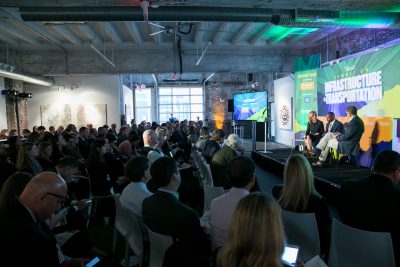This week The Atlantic’s Summit on Infrastructure and Transportation explored the state of America’s infrastructure and where it’s heading in the future. The summit included a series of panels with guests discussing technology and the future of infrastructure, natural disasters and resiliency, and infrastructure projects taking place across the nation.
The panel, “Infrastructure in Critical Condition,” was a conversation with Kristina Swallow, PE, President of the American Society of Civil Engineers and James Dalton, Director of Civil Works with the U.S. Army Corps of Engineers and was moderated by Steve Clemons, The Atlantic’s Washington Editor at Large. Both panelists highlighted that America’s infrastructure is not meeting our current needs and civil engineers must work to protect the public’s health, safety, and welfare through infrastructure improvements. Throughout the 20-minute panel, they discussed two key themes: building for the future and modifying what they currently have. The need for increased investment was a recurring message, as Dalton pointed out that we will not be able to solely innovate our way out of these challenges.

Building For The Future
When asked about climate change, Dalton noted that civil engineers prepare for the future by designing and building resilient infrastructure, including creating infrastructure that can withstand climate change, including imminent droughts, flooding, and rising sea levels. Civil engineers can build resiliently and for the future by not only looking at individual pieces of infrastructure, but also by looking at full systems such as the relationship between dams and levees, which can help civil engineers better prepare for future disasters.

Modifying What We Have
When it comes to infrastructure, the federal government seems to be at a stand-still, prompting states and localities to take action. In the panel, Swallow noted that Seattle, just one of many localities across the country working to improve its infrastructure, has begun to modify existing transportation infrastructure and maximize the benefit this can provide. This is just one example of how our nation is working on finding infrastructure solutions when the federal government does not have one.
“Breaking Through: A Transformation in Seattle,” also discussed infrastructure innovation in Seattle and featured ASCE board member, Roger Millar Jr., P.E., F.ASCE, Secretary of the Washington State Department of Transportation. Other panels included discussions on the current state of Puerto Rico’s infrastructure following Hurricane Maria, transportation improvements in the Washington, DC metropolitan area including construction of the Hyperloop, and how we can adapt our infrastructure to accommodate autonomous vehicles.
Watch all of the panels from The Atlantic’s Summit on Infrastructure and Transportation here.




